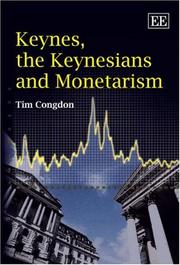| Listing 1 - 3 of 3 |
Sort by
|
Book
ISBN: 1852784415 1788970705 Year: 1992 Publisher: Aldershot, England ; Brookfield, Vt. : E. Elgar Institute of Economic Affairs,
Abstract | Keywords | Export | Availability | Bookmark
 Loading...
Loading...Choose an application
- Reference Manager
- EndNote
- RefWorks (Direct export to RefWorks)
The last 20 years have seen severe macroeconomic instability in Britain, with three extreme and highly damaging boom-bust cycles. Professor Tim Congdon, one of the City's most well-known commentators, has been an influential critic of successive governments' failures in economic policy throughout this period. Reflections on Monetarism brings together his most important academic papers and journalism, including his remarkably prescient series of articles in The Times from 1985 to 1988 forecasting that the Lawson credit boom would wreck the Thatcher Government's reputation for sound financial management. He presents a powerful argument that the root cause of Britain's economic instability has been the volatile growth of credit and the money supply.
Money. Monetary policy --- Great Britain --- Monetary policy --- Economic policy --- Government --- Economic Instability --- Macroeconomics --- British Economics

ISBN: 1847201393 9786613220462 1283220466 1847206921 9781847201393 Year: 2007 Publisher: Cheltenham, UK : Edward Elgar Publishing Limited,
Abstract | Keywords | Export | Availability | Bookmark
 Loading...
Loading...Choose an application
- Reference Manager
- EndNote
- RefWorks (Direct export to RefWorks)
Challenges several 'conventional wisdoms' about UK macroeconomic policy, arguing that the Keynesians' advocacy of incomes policy and fiscal activism in the post-war decades did not have a strong basis in Keynes' own writings. This book denies that the UK had a 'Keynesian revolution', in the sense of a deliberately pursued fiscal activism.
Monetary policy --- Monetary policy - Great Britain --- 332.4941 --- 333.403 --- 333.80 --- GB / United Kingdom - Verenigd Koninkrijk - Royaume Uni --- Monetaire theorieën. Kwantitatieve theorie. Theorie van de incasso's. Optiek van de uitgaven en inkomens --- Geld-, bank- en kredietpolitiek. Kapitaalmarkt en -rente: algemeenheden --- Keynesian Economics --- Macroeconomics --- Monetarism --- British Economics --- Money. Monetary policy --- Keynes, John Maynard
Book
ISBN: 022610852X 9780226108520 9780226108490 022610849X 9780226108490 9781306980401 1306980402 Year: 2014 Publisher: Chicago
Abstract | Keywords | Export | Availability | Bookmark
 Loading...
Loading...Choose an application
- Reference Manager
- EndNote
- RefWorks (Direct export to RefWorks)
Historians of science have long noted the influence of the nineteenth-century political economist Thomas Robert Malthus on Charles Darwin. In a bold move, Piers J. Hale contends that this focus on Malthus and his effect on Darwin's evolutionary thought neglects a strong anti-Malthusian tradition in English intellectual life, one that not only predated the 1859 publication of the Origin of Species but also persisted throughout the Victorian period until World War I. Political Descent reveals that two evolutionary and political traditions developed in England in the wake of the 1832 Reform Act: one Malthusian, the other decidedly anti-Malthusian and owing much to the ideas of the French naturalist Jean Baptiste Lamarck. These two traditions, Hale shows, developed in a context of mutual hostility, debate, and refutation. Participants disagreed not only about evolutionary processes but also on broader questions regarding the kind of creature our evolution had made us and in what kind of society we ought therefore to live. Significantly, and in spite of Darwin's acknowledgement that natural selection was "the doctrine of Malthus, applied to the whole animal and vegetable kingdoms," both sides of the debate claimed to be the more correctly "Darwinian." By exploring the full spectrum of scientific and political issues at stake, Political Descent offers a novel approach to the relationship between evolution and political thought in the Victorian and Edwardian eras.
Social evolution --- Evolution (Biology) and the social sciences --- Political science --- Social Darwinism --- Evolution (Biology) --- Malthusianism --- Mutualism --- Political aspects. --- History --- History --- Political aspects. --- Political aspects. --- Political aspects. --- History --- Malthus, T. R. --- Lamarck, Jean Baptiste Pierre Antoine de Monet de, --- Influence. --- Influence. --- politics, political, mutualism, evolution, victorian england, victorianism, history, science, historical, 19th century, europe, english, british, economics, economist, charles darwin, thomas robert malthus, demography, population growth, intellectualism, origin of species, 1832 reform act, jean baptiste lamarck, naturalism, refutation, debate, hostility, society, cultural studies, biology, darwinian, darwinism, morality, ethics, meaning, culture.
| Listing 1 - 3 of 3 |
Sort by
|

 Search
Search Feedback
Feedback About UniCat
About UniCat  Help
Help News
News